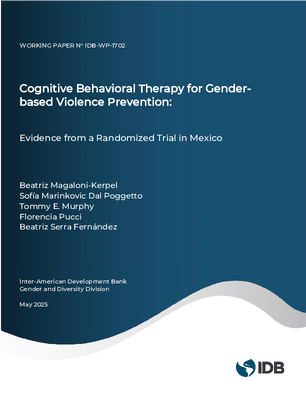Cognitive Behavioural Therapy for Gender-based Violence Prevention: Evidence from a Randomized Trial in Mexico
Date issued
May 2025
Subject
Gender-Based Violence;
Educational Institution;
Women;
Violence Prevention;
Regulation;
Cognitive Development;
Gender;
Skills;
Intimate Partner Violence;
Risk Management;
Debtor Finance
JEL code
J16 - Economics of Gender • Non-labor Discrimination;
I31 - General Welfare, Well-Being;
Z18 - Public Policy;
H43 - Project Evaluation • Social Discount Rate
Country
Mexico
Category
Working Papers
Cognitive behavioral therapy (CBT) has become a powerful and effective tool to deal with violence in many at-risk areas in the world. However, its use for gender-based violence (GBV) and dating violence, although promising, has been limited and used as a response service for survivors, rather than for prevention. To understand to what extent such interventions can help provide tools and skills to young people in their impressionable years to produce behavioral changes that prevent GBV, we carried out such an intervention among high school students in the municipality of Ecatepec in Mexico. We assessed the intervention with a randomized control trial. We introduce the novelty of collecting objective measures from automated neuropsychological tests to explore whether CBT might be functioning through the development of subjects' executive functions. Results from this intervention fail to show any clear change in self-reported violence. They do show, however, impacts on executive functions related to violence, such as emotional recognition and inhibitory control skills.
Generative AI enabled




